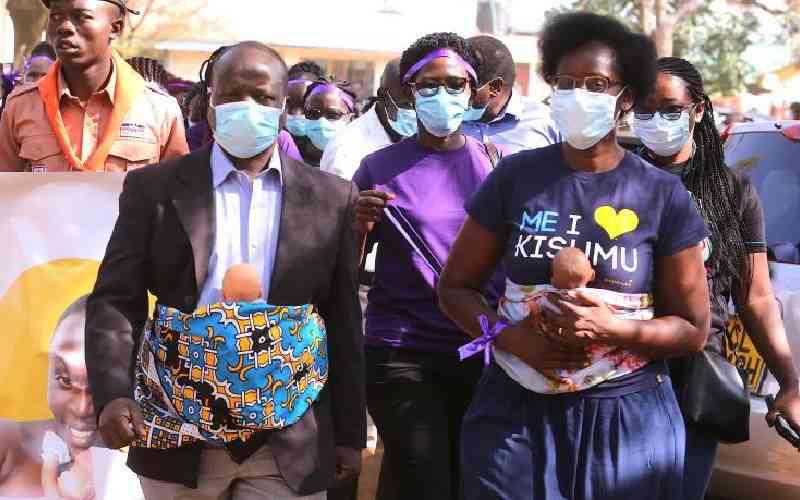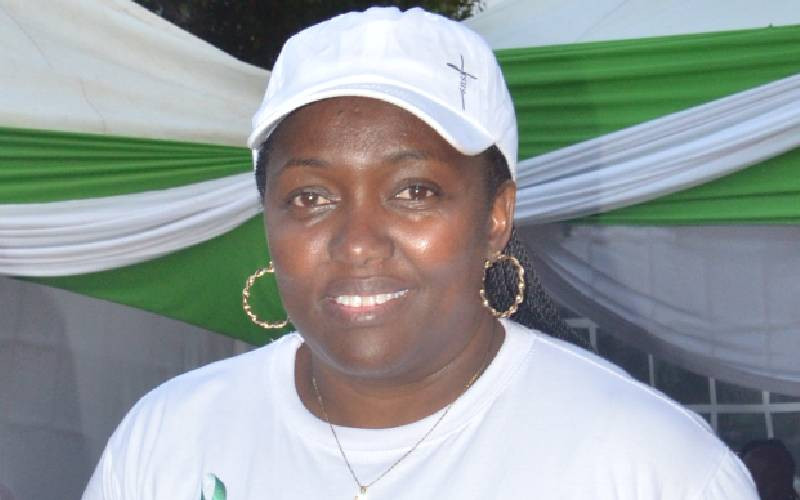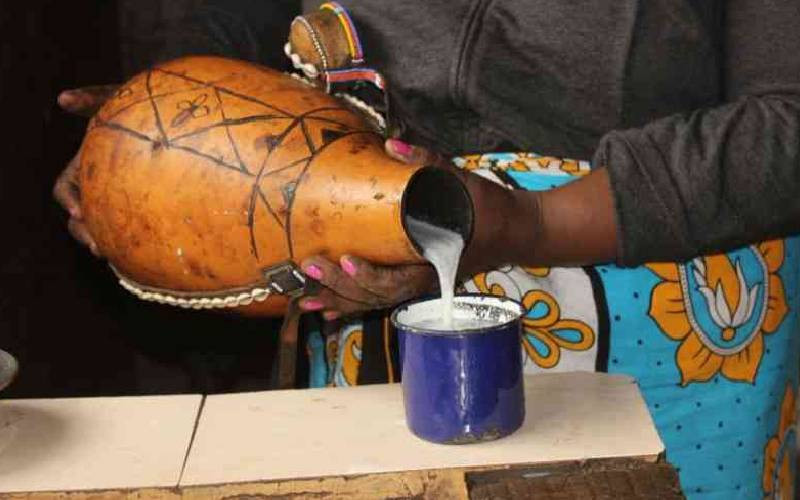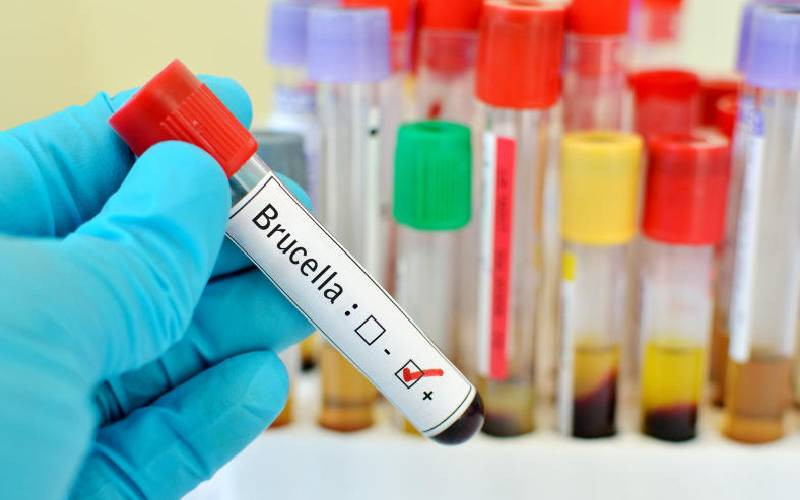
When Raziah Ramadhan, 30, started experiencing labour pains on November 6 of this year, she assumed it was a false flag.
Soon after, she was admitted to the Kakamega County Teaching and Referral Hospital (KCTRH) maternity ward even though her pregnancy had not grown to full term. Later, she would become the latest statistic of mothers who have experienced preterm births in the country.
In Kenya, approximately 134,000 babies are born prematurely every year. A bigger percentage of them die due to complications of prematurity while others face lifelong disability, ranging from learning disability to visual and hearing problems.
Raziah's delivery was almost seamless even after she experienced preterm labour. However, the baby was immediately intubated and rushed to the neonatal intensive care unit. She had been born prematurely, had a low birth weight of 1500 grammes and had difficulty breathing. Raziah says nurses were quick to save her baby's life and put her on oxygen.
"The baby is always on my chest skin-to-skin contact for at least eight hours a day to aid her in breathing, regulate the baby's heart rate, and help her to better adapt to life outside the womb. When I am tired, the baby is put in the incubator," says Raziah.
- Ministry, governors clash over ghost workers in health payroll
- Ghost worker claims fuel uncertainty in prolonged UHC standoff
- Health insurance reforms echo NHIF failures, add new burdens
- Kenya emerges as East Africa's Digital Health hub in push for UHC
Keep Reading
After a week, the baby had gained 1,600 grammes and was only waiting for her to hit the 1,800 mark before they could be discharged to be monitored from home.
In the same ward, we meet Evelyn Juma, 26, from Maraba village in Kakamega municipality who has stayed in hospital since October 10. She has a set of twins born preterm at week 28.
"I gave birth vaginally to twins but one of them died after delivery. The one who survived was 1,200 grammes," said Evelyn.
She added: "I am only waiting for the baby who is now 1,468 grammes to attain 1,800 grammes so that we can be discharged from the hospital."
Also in the Kangaroo Mother Care (KMC) unit is Saumu Abdallah, 27, who gave birth when her pregnancy was just 7 months. She delivered twins at Mwihila Hospital in Khwisero Sub County but one of them died and the one who survived was 1,000 grammes.
"I was rushed to the referral hospital where I have stayed for 57 days and received good care because there was a steady supply of oxygen which helped my baby to survive," says Saumu.
She went on: "The baby has been sickly, had inadequate blood and got transfused and breathing difficulties. The doctors and nurses helped me walk through the journey and the baby is now 1,750 grams, and when at 1,800 grams, we will be discharged."
Kakamega County Teaching and Referral Hospital together with Pumwani Maternity Hospital, Kakamega, Lodwar, Kilifi, and Garissa County Hospitals, through the support of UNICEF, were established as regional Maternal and Newborn learning centres for in-service and pre-service skills, which has helped reduce prematurity deaths.
Dr Boniface Nyumbile a consultant paediatrician at Kakamega Teaching and Referral Hospital says that the referral hospitals admit at least 150 babies every month, out of which, 55 per cent (83 babies) are born pre-term.
According to Dr Nyumbile, prematurity is the leading cause of death among children under the age of five years not only in Kenya but worldwide.
"The biggest challenge we face as a country is adequate equipment and machines like incubators and functioning ICU units to take care of pre-term babies," said Nyumbile.
Dr Roselyne Malangachi, a consultant paediatrician at Kakamega Teaching and Referral Hospital says the majority of preterm babies can survive and thrive with low-cost, effective interventions.
"These include the clinical interventions defined in the essential newborn care package, and interventions specific to the preterm birth such as Kangaroo mother care," she says.
She adds that the three low-cost interventions that are very effective in improving preterm survival but have poor utilization are Steroid injections which she says should be given to a mother in preterm labour.
"Dexamethasone helps speed up the development of the baby's lungs and prevent premature babies from going into respiratory distress when they are born," she said.
On Kangaroo Mother Care, Malangachi said the technique is where the tiny infant is held skin to skin on the mother's chest to 'keep the baby warm' have the baby's temperature regulated, and facilitate breastfeeding.
"Keeping preterm babies warm is especially important because their tiny bodies lose heat rapidly, making them highly vulnerable to illness, infection, and death," said Dr Malangachi
She went on: "Continuous positive airway pressure (CPAP) in preterm newborns with respiratory distress syndrome helps to reduce neonatal mortality and significantly lower risk of respiratory failure requiring assisted breathing as compared with oxygen therapy alone,"
Dr Malangachi said poor nutrition before and during pregnancy, smoking and drinking alcohol, infections such as urinary tract and amniotic membrane infections, and a history of premature birth in a previous pregnancy are some of the causes of pre-term births.
Others are extremes of maternal age and uterine malformations.
 The Standard Group Plc is a multi-media organization with investments in media
platforms spanning newspaper print
operations, television, radio broadcasting, digital and online services. The
Standard Group is recognized as a
leading multi-media house in Kenya with a key influence in matters of national
and international interest.
The Standard Group Plc is a multi-media organization with investments in media
platforms spanning newspaper print
operations, television, radio broadcasting, digital and online services. The
Standard Group is recognized as a
leading multi-media house in Kenya with a key influence in matters of national
and international interest.











